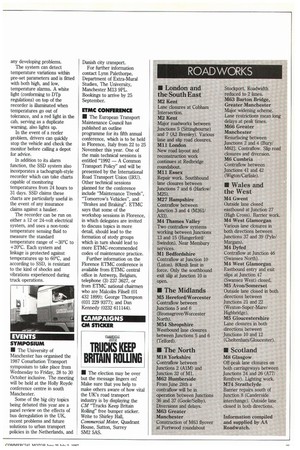REFRIGERATION
Page 26

Page 27

If you've noticed an error in this article please click here to report it so we can fix it.
SSD ALARM SYSTEM WATCHES LOADS • With many supermarkets and retail chains now insisting on proof that frozen and chilled produce has been transported in the correct condition, Nottingham-based company Sydney Smith Dennis (0602 861341) is offering a vehiclemounted condition monitoring and alarm system for around £250 which alerts drivers to any developing problems.
The system can detect temperature variations within pre-set parameters and is fitted with both high, and low, temperature alarms. A white light (conforming to DTp regulations) on top of the recorder is illuminated when temperatures go out of tolerance, and a red light in the cab, serving as a duplicate warning, also lights up.
In the event of a reefer problem, drivers can quickly stop the vehicle and check the monitor before calling a depot for advice.
In addition to its alarm function, the SSD system also incorporates a tachograph-style recorder which can take charts capable of monitoring temperatures from 24 hours to 31 days. SSD claims these charts are particularly useful in the event of any insurance claims against a haulier.
The recorder can be run on either a 12 or 24-volt electrical system, and uses a non-toxic temperature sensing fluid to measure the standard temperature range of —30°C to +20°C. Each system and linkage is protected against temperatures up to 60°C, and according to SSD, is resistant to the kind of shocks and vibrations experienced during truck operations.




















































































































































